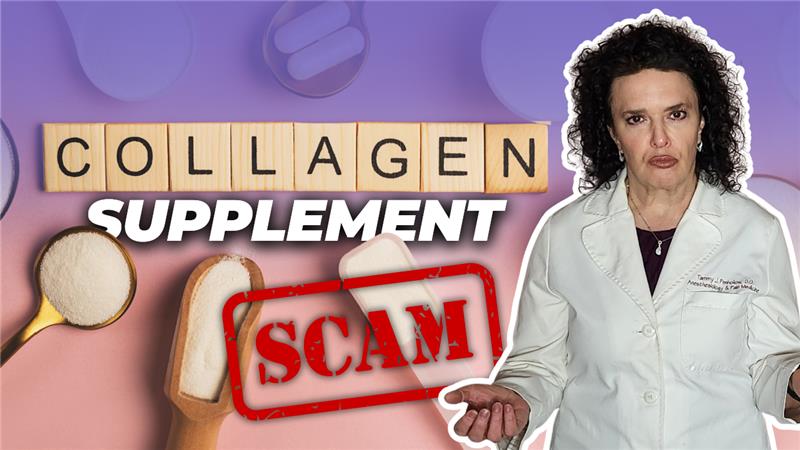
Stop Wasting Money on Collagen: 5 Ways To Fix Joint Pain Instead
Are collagen supplements truly the miracle solution they claim to be for better skin, stronger joints, and overall health? Or have we all bought into a cleverly marketed myth?
In this episode, we take a closer look at what collagen actually does in the body. Discover why most supplements might not work the way you think and what science says about their real effectiveness. You’ll also get a sneak peek at some natural, evidence-based strategies that support your body from the inside out, without relying on expensive powders or pills.
Curious whether you're wasting your money or missing out on something better? Dive in to find out what really supports joint health, skin vitality, and more.
Episode Video

The Collagen Supplement Myth
Collagen supplements have become a booming trend, promising everything from smoother skin to healthier joints. But here's the truth: collagen powders, pills, and drinks might not be delivering the benefits you think they are. In fact, there’s a growing body of evidence suggesting you're better off investing in natural, science-backed alternatives that actually work.
This article explores the collagen supplement myth, explains what collagen really is, and reveals natural, evidence-based strategies for better skin, stronger joints, and overall health. All without relying on expensive and often ineffective supplements.
Why Collagen Supplements May Not Work
Collagen is a protein found in connective tissues like skin, tendons, cartilage, and bone. However, it's important to understand that collagen doesn’t exist in hair, despite what many beauty products might claim. So if you’re buying collagen-infused vitamins or supplements for your hair, you're likely wasting your money.
When consumed as a supplement, collagen is broken down into amino acids, mainly glycine, proline, and hydroxyproline. But here’s the kicker: your body doesn't magically rebuild these into collagen in the areas you hope it will. Instead, collagen is best produced naturally by the body through a proper combination of high-quality protein and vitamin C, along with healthy lifestyle choices.
Natural Ways to Boost Collagen the Right Way
Rather than relying on collagen supplements, here are five evidence-based ways to boost collagen naturally and support your joints, muscles, and skin from within.
High-Quality Protein + Vitamin C
The body builds its own collagen using amino acids from protein and the antioxidant power of vitamin C. Lean meats like chicken, beef, bison, and lamb, when free of hormones and antibiotics, are excellent protein sources. For pescatarians, clean fish low in mercury is a great option. Vegetarians can turn to tofu, legumes, eggs, and dairy.
Pairing protein with vitamin C-rich foods such as citrus fruits, bell peppers, and berries enhances collagen production and supports muscle repair. For example, adding a squeeze of lemon over fish or incorporating oranges into meals can help naturally stimulate collagen synthesis.
Omega-3 Fatty Acids
Omega-3s, especially the EPA and DHA found in fish oil or algae supplements, are essential for joint lubrication and have anti-inflammatory benefits. They're also great for heart, eye, and brain health. These fatty acids help reduce inflammation and support healthy connective tissues, no collagen powder needed.
Probiotics and Gut Health
A healthy gut supports everything from immunity to skin health. Probiotics can reduce systemic inflammation and improve nutrient absorption, indirectly supporting collagen formation. You can nourish your gut through fermented foods like yogurt, kefir, kimchi, and sauerkraut, or with a high-quality probiotic supplement.
Walking, Movement, and Strength Training
Low-impact exercise like walking increases the circulation of synovial fluid in the joints, which naturally nourishes and lubricates them. Add strength training to further support muscles and tendons. Movement not only supports joint health without collagen supplements, but also promotes overall vitality and longevity.
Stay Hydrated
Water is the original skin plumper and joint lubricant. Consistent hydration throughout the day helps keep skin supple and joints moving smoothly. Aim for steady water intake instead of chugging it all at once, and avoid drinking too much right before bed to prevent sleep interruptions.
Bonus Tip: Turmeric Root for Inflammation
One overlooked powerhouse for joint and skin health is fresh turmeric root. It contains curcumin, a potent anti-inflammatory compound. Using fresh turmeric instead of powdered versions helps avoid contamination from poor-quality soil.
Grate or slice the fresh root into curries, blend it into smoothies, or steep it into tea. Combining turmeric with water not only boosts hydration but also supports inflammation control naturally and deliciously.
Final Thoughts
The hype around collagen supplements often overshadows what really works. Rather than relying on a supplement that your body may not even absorb as intended, focus on natural ways to boost collagen through whole foods, movement, hydration, and anti-inflammatory ingredients. When you support your body with the right inputs, you'll see real results, stronger joints, healthier skin, and better overall wellness without wasting money on the collagen supplement myth.
If joint pain or skin issues persist, it's always smart to speak with a doctor who can help you uncover the root cause and develop a targeted, effective plan.
If you're ready to take control of your knee pain, click here to discover more about these five effective knee pain home treatments. With these simple steps, you can start your journey towards pain-free knees and a more active lifestyle.
